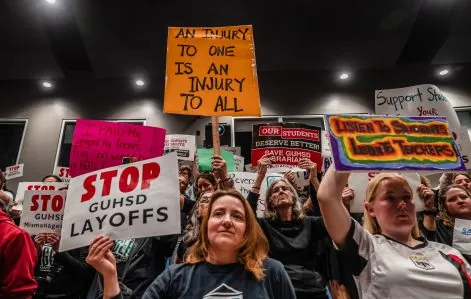Several New Laws Protect Workers’ and Survivors’ Rights Starting in 2024
At Haeggquist & Eck, our lawyers are proud members of the California Employment Lawyers Association (CELA) because they fight for employee rights as we do. We stay up to date on current legislation and new laws that affect workers’ rights. Below are some of the new laws protecting workers’ and survivors’ rights that will be in effect as of January 1, 2024.1
Protecting Survivors from Weaponized Defamation Lawsuits – AB 933
This new amendment strengthens the existing California defamation law to better protect speech made by survivors of sexual assault, harassment, and discrimination from retaliatory and baseless defamation lawsuits filed by those who harmed them and allows them to recoup their legal fees and seek treble damages if they successfully defend their defamation suit. The law now states that “communications made without malice regarding sexual assault, harassment, or discrimination” are privileged, and that if a survivor wins a defamation suit in these cases, the accuser who filed the suit is on the hook for the legal fees. Specifically, the survivor would be “entitled to reasonable attorney’s fees and costs, plus treble damages for any harm caused to them by the defamation action against them, in addition to punitive damages available.”
Reproductive Loss Leave – SB 848
California employees can now take up to 5 days of reproductive loss leave when experiencing a reproductive loss event, including a miscarriage, failed adoption, or an unsuccessful assisted reproductive technology procedure. This leave is in addition to the bereavement leave that employees can already take for the death of a family member. The reproductive loss leave must be taken within 3 months of the event and, in the absence of an existing policy, can be unpaid. An employer cannot refuse or retaliate against the employee for taking this leave or giving information or testimony regarding it.
Workplace Violence Prevention Plan – SB 553
This is the first workplace violence prevention law that requires California employers to create, adopt, and implement written workplace violence prevention plans that include annual training, violent incident logs, and the creation and retention of various records. Cal/OSHA will begin enforcing this new law on July 1, 2024. This law also allows employers or collective bargaining representatives of employees who have suffered violence or a threat of violence in the workplace to seek a temporary restraining order and an order after hearing on behalf of the employee and other employees.
Equal Pay and Anti-Retaliation Protection Act – SB 497
Existing law already protects employees by prohibiting employers from discharging or discriminating against them for reporting violations of the law or taking other protected actions. This amendment to the California Labor Code creates a rebuttable presumption of retaliation if an employee is disciplined or discharged within 90 days of certain protected activity. This makes it easier for employees to establish they have been retaliated against by their employer. It also prohibits employers from paying an employee a wage lower than the rate paid to another employee of the opposite sex for the same work and retaliating against an employee for examining, disclosing, discussing, or aiding with wage-related information.
Employment Discrimination: Cannabis Use Outside of the Workplace – SB 700
The California Fair Employment and Housing Act prohibits employers from discriminating against employees based on several categories. Employers are not allowed to discriminate against someone due to their use of cannabis outside of the workplace. Beginning in 2024, it is unlawful for employers to ask applicants about their prior use of cannabis. This exemption does not apply if employers are allowed to consider or inquire about that information according to the Fair Employment and Housing Act or other relevant state or federal laws.
Non-Compete Agreements – AB 1076
This codifies existing case law that states that any non-compete agreement entered into as part of an employment contract is void and unenforceable unless it meets certain exceptions. It makes it unlawful for an employer to include a non-compete clause in an employment contract or require an employee to enter a non-compete agreement that does not meet the exceptions. It also requires employers to notify current and former employees in writing by February 14, 2024, that the non-compete clause or agreement is void and unenforceable. Violating this law would be considered an act of unfair competition.
Contracts in Restraint of Trade – SB 699
This law prevents California employers from entering into contracts with employees or prospective employees that restrict their ability to engage in another lawful profession, trade, or business. It makes it illegal for employers or former employers to attempt to enforce contracts that are void under existing laws. If an employer violates this law, they will commit a civil violation and the employee, former employee, or prospective employee could take legal action to receive compensation for any damages and to cover attorney’s fees and costs. It also bans enforcement of non-competition agreements entered into between parties located outside of California if the employee has since then relocated to California or is otherwise seeking employment with a California company.
Paid Sick Days Accrual and Use – SB 616
The Healthy Workplaces Healthy Families Act of 2014 was amended to increase the paid sick leave requirement that employers in California must provide from 3 to at least 5 days or 40 hours within 6 months of employment. It also includes provisions on how employees can use paid sick days. This amendment excludes railroad employers and their employees from the act’s provisions and makes changes for CBA (Collective Bargaining Agreement) employees and certain individual providers of in-home supportive services. Lastly, it includes provisions that shall preempt any local ordinance to the contrary.
Arbitration Appeal Delays – SB 365
Corporations can no longer delay justice for workers and consumers. Previously, corporate defendants could effectively pause a worker’s or consumer’s case, sometimes for years at a time, by simply filing an appeal. With the passing of SB 365, cases can now move forward even if a company files an appeal, instead of putting the case on hold.
Source:





